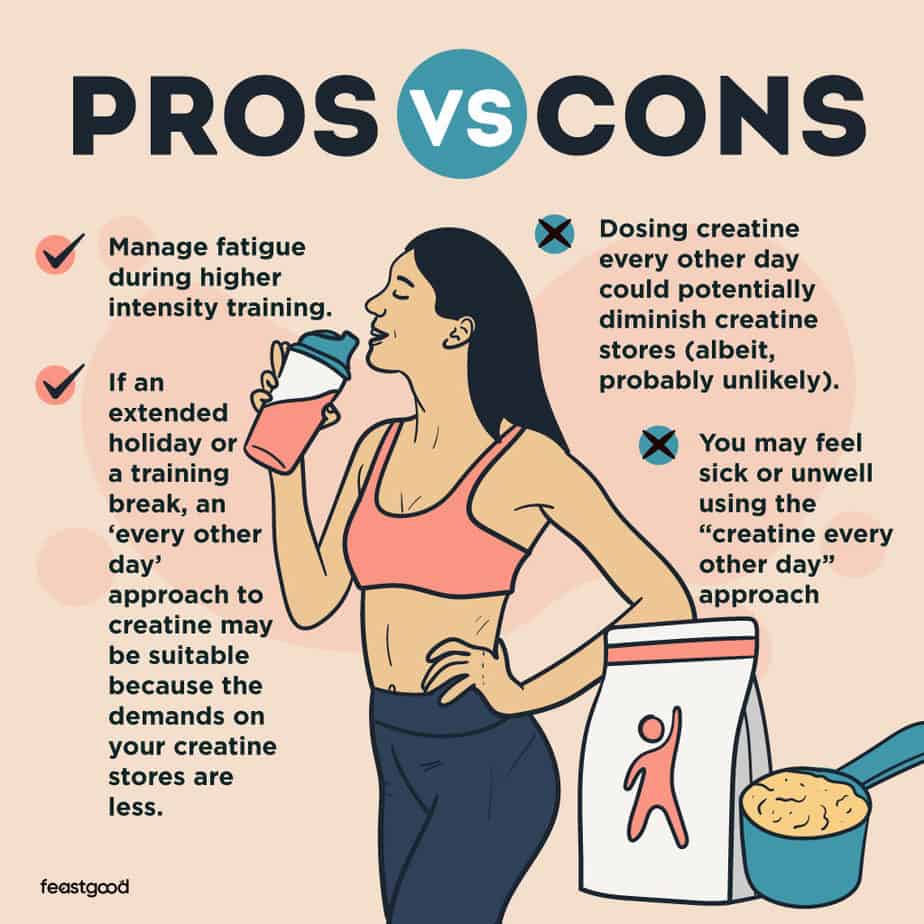Is Creatine Right For Me? Benefits, Risks, And Dosage

Table of Contents
The Benefits of Creatine
Creatine monohydrate is a naturally occurring compound found in small amounts in meat and fish. Supplementing with creatine offers several compelling advantages for those seeking to enhance their physical performance and overall well-being.
Increased Muscle Strength and Power
Creatine supplementation leads to significant gains in strength and power output, particularly during high-intensity activities. This is because creatine increases the availability of adenosine triphosphate (ATP), the primary energy source for muscle contractions.
- Improved Performance: Expect improvements in weightlifting, sprinting, jumping, and other explosive movements.
- Faster Recovery: Creatine facilitates faster muscle recovery after intense workouts, reducing muscle soreness and allowing for more frequent training sessions.
- Muscle Hypertrophy: Creatine supports muscle hypertrophy (growth) by promoting increased muscle protein synthesis. This contributes to noticeable increases in muscle size and mass when combined with a proper training and nutrition plan.
Enhanced Athletic Performance
The benefits of creatine extend beyond simply increasing strength. It significantly boosts short-duration, high-intensity exercise performance across a range of activities.
- Increased Work Capacity: Creatine allows you to perform more work before experiencing fatigue, leading to longer, more productive workouts.
- Improved Power Output: Studies consistently demonstrate positive effects on various sports, including weightlifting, basketball, swimming, and even cycling, showcasing its versatility.
- Enhanced Endurance: While primarily known for its effects on high-intensity activities, some research suggests creatine may also have positive effects on endurance performance, particularly in combination with carbohydrate loading.
Cognitive Benefits
While primarily known for its impact on muscle performance, emerging research suggests that creatine may also offer cognitive benefits.
- Improved Memory and Cognition: Some studies indicate that creatine supplementation may improve memory, learning ability, and overall brain processing speed.
- Potential Neurological Benefits: Creatine may be beneficial for individuals with certain neurological conditions, such as Alzheimer's disease or Parkinson's disease. However, this is an area requiring further research and should only be considered under strict medical supervision.
- Important Note: The cognitive effects of creatine are still under investigation, and more research is needed to fully understand its impact on brain function.
Potential Risks and Side Effects of Creatine
While generally safe for healthy individuals, creatine supplementation can cause some side effects. It's important to be aware of these potential risks to make an informed decision.
Water Retention
Creatine causes water retention, leading to a temporary increase in body weight. This is a common and usually harmless side effect.
- Short-Term Weight Gain: The weight gain is primarily due to water retention in the muscles, not fat accumulation.
- Resolution: This effect generally resolves once creatine supplementation is stopped.
Gastrointestinal Issues
Some individuals experience mild digestive upset, such as bloating, diarrhea, or nausea, particularly when starting with high doses of creatine.
- Dosage Management: Starting with a lower dosage and gradually increasing it can help minimize gastrointestinal discomfort.
- Individual Variation: The severity of these effects varies significantly from person to person.
Kidney Issues
Concerns regarding kidney function have been raised, but well-designed studies in healthy individuals have not shown significant negative effects on kidney function with proper use and hydration.
- Pre-existing Conditions: Individuals with pre-existing kidney conditions should consult their doctor before taking creatine.
- Hydration is Key: Maintaining adequate hydration is crucial to mitigate any potential risks.
Muscle Cramps
Increased muscle cramping is a reported side effect, though not consistently observed in research.
- Hydration and Electrolytes: Proper hydration and electrolyte balance are important to minimize the risk of muscle cramps, regardless of creatine supplementation.
Proper Creatine Dosage and Cycling
To maximize the benefits and minimize the risks of creatine, it's essential to follow a proper dosage and cycling regimen.
Loading Phase
Many users begin with a loading phase to quickly saturate their muscles with creatine.
- Loading Dosage: Consume 20 grams of creatine monohydrate daily, divided into four 5-gram doses, for 5-7 days.
- Accelerated Saturation: This approach accelerates muscle creatine saturation, leading to quicker results.
Maintenance Phase
After the loading phase, a lower maintenance dose is sufficient to maintain muscle creatine levels.
- Maintenance Dosage: Reduce your daily intake to 3-5 grams.
- Long-Term Benefits: This lower dose effectively maintains the benefits of creatine supplementation long-term.
Cycling
Cycling creatine (periods of supplementation followed by periods off) is a common practice, but its necessity is debated among experts.
- Consult Your Doctor: The optimal cycling strategy, if any, depends on individual factors and should be discussed with your healthcare provider.
- No Clear Consensus: There's no definitive scientific evidence supporting the superiority of cycling over continuous creatine supplementation.
Combining Creatine with other Supplements
Creatine is often combined with other supplements to enhance results.
- Protein Powder: Combining creatine with protein powder can optimize muscle protein synthesis, further enhancing muscle growth and recovery.
- Consult a Professional: Speak to a health professional to determine if combining creatine with other supplements is right for your goals and to avoid any potential interactions.
Conclusion
Creatine can be a valuable supplement for boosting athletic performance and muscle growth, but it's crucial to understand both its benefits and potential risks. By following the recommended dosage and being aware of potential side effects, you can safely determine if creatine is right for your specific needs. Remember to consult with your physician or a registered dietitian before starting any new supplement regimen, including creatine. If you're looking to improve your strength, power, and athletic performance, learning more about creatine and its effects is a great first step. Is creatine right for you? Only you can decide after careful consideration of the information provided.

Featured Posts
-
 Seattle Mariners Vs Detroit Tigers Injury Update And Weekend Series
May 17, 2025
Seattle Mariners Vs Detroit Tigers Injury Update And Weekend Series
May 17, 2025 -
 Acidente De Onibus Universitario Investigacao Em Andamento
May 17, 2025
Acidente De Onibus Universitario Investigacao Em Andamento
May 17, 2025 -
 Liverpool Target Angelo Stiller Latest Update From German Media Bad News For Arne Slot
May 17, 2025
Liverpool Target Angelo Stiller Latest Update From German Media Bad News For Arne Slot
May 17, 2025 -
 70 000 Ziurovu Jau Pamate Populiariausi Kino Pavasario Filmai
May 17, 2025
70 000 Ziurovu Jau Pamate Populiariausi Kino Pavasario Filmai
May 17, 2025 -
 Tiffany Trump And Michael Boulos Welcome First Child A Look At The Trump Family Tree
May 17, 2025
Tiffany Trump And Michael Boulos Welcome First Child A Look At The Trump Family Tree
May 17, 2025
